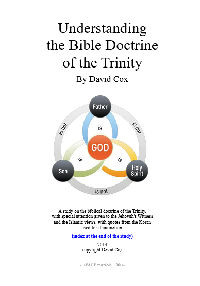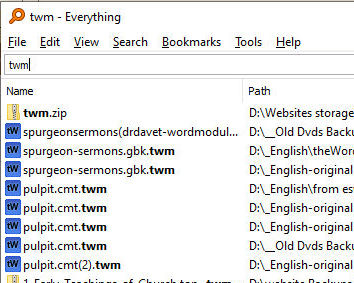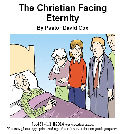The Silence of God Theodicy
Topic: The Silence of God Theodicy
By Sir Robert Anderson
Theodicy. This work is about when God is silent, the silence of God, which in theology it is theodicy. Why doesn’t God immediately vindicate his children. Or why does God allow his children to suffer?
Robert Anderson worked for Scotland Yard in England, and he was an excellent investigator. He was also a dispensation writer.
This work explains why God “doesn’t work like we would expect him to work.” This is theodicy.
CONTENTS (studied and added by David Cox)
1. Where is God when people suffer?
2. The Inaction of Christ
3. Direct Divine Interposition
4. Where are miracles today?
5. Miracles for the Jews
6. Difficulty of a Silent Heaven
7. Crucified their Messiah
8. The Church or the Bible?
9. Agnostic’s view of Christian Doctrine
10. Paul’s “My Gospel”
11. The god of this World
12. Christ and the Cross is the Final Word
13. The Suffering of Saints
Appendices
I. The alleged miracles of spiritualism and faith healing
II. The use and meaning of the word “religion” in this work 171
III. The purpose and scope of the Acts of the Apostles . 172
IV. A new dispensation began when the Jews rejected the Pentecostal testimony 177
V. The meaning of ” mystery” in the New Testament . 180
VI. Examination of passages of Scripture relative to the Devil and his temptations 182
VII. Further exegesis of John viii. 44-The effect of Satan’s influence in the world 186
VIII. The Satan Myth 189
IX. The gospel of Divine grace, and men’s attitude towards it 200
X. “Of what value, then, is prayer?” . . . . 203
XI. Abandonment of the critical attack on the New Testament – Mr. A. D. White and Professor Harnack . 2088
CONTENTS from the actual book (has no chapter titles)
Preface
CHAPTER I. The problem stated, and exemplified by the Armenian atrocities and the massacre of Christian missionaries, by “the Christian persecutions” and the common experience of Christians generally
CHAPTER II. A reference to Scripture seems only to make the difficulty greater -The advent of Christ seemed to give promise of a new order of things, and the experience of the Pentecostal Church appeared to confirm the hope.
CHAPTER III. As this discussion assumes the possibility of direct Divine interposition, the infidel objections to miracles are considered and refuted-But why have they ceased? Mr. Balfour’s suggestion affords no answer – Mr. Gladstone’s argument criticised – The problem exemplified-Doctrinaire and practical infidels contrasted 19
CHAPTER IV. The seeming cogency of John Stuart Mill’s argument against Christianity shown to depend on the error of Paley’s position. Bishop Butler’s thesis that miracles were the ground of the faith of the first converts discussed and refuted-The purpose and evidential value of the miracles of Christ- His ultimate appeal was to Scripture, not to miracles- Christianity not a religion-In what sense external evidence can accredit a revelation 33
CHAPTER V. In confirmation of the view that it was for the Jew the miracles were given, the Acts of the Apostles gives proof that the miracles ceased when the favoured nation was rejected; and the record of that rejection is shown to be the main purpose of the Book 48
more
CHAPTER VI. Restatement of the difficulty of a silent Heaven – The solution must be found in Scripture, and notably in the Epistles of Paul – But the discussion assumes that these Epistles contain the revelation of Christianity – This thesis discussed – Christianity distinguished from the religion of Christendom 61
CHAPTER VII. In continuation of the argument of Chap. VI., Baur’s theories are shown to be but the travesty of a lost truth – Having crucified their Messiah, the Jews received a further offer of pardon – Hence the Jewish character of the Pentecostal dispensation – Their rejection of mercy, signalised by the murder of Stephen, led to the revelation of the great truth of Christianity 71
CHAPTER VIII. Review of the preceding inquiry, leading up to the position that the characteristic truth of Christianity must be sought for In the Epistles-Before turning to St. Paul’s teaching, a further defence of Holy Scripture is offered, against the attacks of rationalists on the one hand and of those who make it subordinate to the Church upon the other . – 84
CHAPTER IX. A digression to notice the Agnostic’s view of Christian doctrine, as stated by the late W. R. Greg; and to explain from the Lord’s parable of the Good Samaritan what that doctrine really is 96
CHAPTER X. The Apostle Paul’s gospel is not to be found in the earlier Scriptures: it was a special revelation to himself-The truth of Reconciliation explained, and shown to be a distinctive “mystery” truth-Eternal salvation is thus brought within reach of all-But why do so few receive the benefit? 106
CHAPTER XI. The answer to the question which closes Chap. X.-The Satan myth contrasted with the Satan of Scripture-His temptations are aimed, not against morals, but against faith – He is “the god of this world,” and influences and controls, not its vices and crimes, but its religion -Hence the neglect and rejection of Christianity 117
CHAPTER XII. In continuation of Chap. X.-The doctrine of Christianity is further unfolded -The present controversy between God and man is shown to be altogether about Christ -The Cross has closed every other question – Grace is supreme and judgment is postponed
CHAPTER XIII. The silence of God is explained by the great characteristic truth of Christianity – His seeming apathy in presence of the sufferings of His own people is a part of the discipline of the life of faith – Final restatement of the main problem, and a recapitulation of the argument of the book. . . 146
APPENDIX. NOTE Theodicy
Anderson Silence of God



 Biblical Definition of Spiritual Abuse
Biblical Definition of Spiritual Abuse Helpful Windows User Tip for "Searching Everything" on your PC.
Helpful Windows User Tip for "Searching Everything" on your PC.
